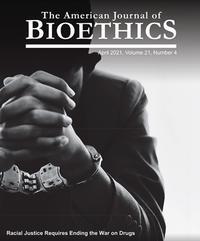“Racial justice requires ending the war on drugs” one of The American Journal of Bioethics’ top ten most cited articles
 We are pleased to share the news that Jonathan Lewis’ from the University’s Centre for Social Ethics in the Department of Law, co-authored article ‘Racial Justice Requires Ending the War on Drugs’ is in The American Journal of Bioethics’top ten most cited publications of the last 3 years.
We are pleased to share the news that Jonathan Lewis’ from the University’s Centre for Social Ethics in the Department of Law, co-authored article ‘Racial Justice Requires Ending the War on Drugs’ is in The American Journal of Bioethics’top ten most cited publications of the last 3 years.
Lead authors Jonathan Lewis, Brian D. Earp (University of Oxford), and Carl L. Hart (Columbia University), together with more than 60 international expert signatories, call for an end to the “war on drugs”, which they argue feeds racism.
According to Jonathan Lewis: “Non-violent offenders serving time for drug use or possession should be freed immediately and their convictions erased. As a matter of urgency, all drugs currently deemed illicit – even crack cocaine and heroin – should be decriminalised. Legalisation and regulation should then follow with restrictions on age, advertising, and licensing”.
Analysing evidence from over 150 studies and reports into how drug prohibition affects users, communities, and human rights, the authors demonstrate the disproportionate impact of prohibition on Black people.
They show that whilst rates of illicit drug use among Black people in the United States are very similar to those among White people, Black people are more likely to be arrested, prosecuted, convicted, and incarcerated—with longer sentences—for drug offenses. The authors argue that these initial race disparities can lead to and maintain long-term vulnerabilities and widening socio-economic disparities, as well as have profound, long-term effects on the health and wellbeing of women and children in Black communities.
“The ‘war on drugs’ has explicitly racist roots and continues to disproportionately target certain communities of color,” say lead study authors Jonathan Lewis and Brian D. Earp.
“Drug prohibition and criminalisation have been costly and ineffective since their inception. It’s time for these failed policies to end.
“The first step is to decriminalise the personal use and possession of small amounts of all drugs currently deemed to be illicit, and to legalise and regulate cannabis. Policymakers should pursue these changes without further delay.”
“The bottom line is that if and when problems with substance use or misuse arise, these should be approached through healthcare programs and social support, not prison time”.
The authors argue that, if managed carefully, this shift in policy will not only improve public health, reduce crime and recidivism, lower unemployment and poverty rates, and save governments large sums of money, but also strike a necessary blow against racial injustice.
Their research adds to growing calls for drug policy reform at a time of continued focus on the injustices faced by Black people.
